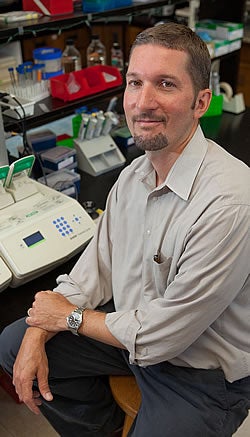Early cell development could hold key to testicular cancer
GREENVILLE, N.C. (July 17, 2012) — Research by an East Carolina University scientist could lead to a better understanding of how testicular cancer develops as well as give insight into how stem cells could be used in medicine.

Dr. Christopher Geyer
Dr. Christopher Geyer, an assistant professor of anatomy and cell biology at the Brody School of Medicine at ECU and a specialist in the male reproductive system, is the principal investigator on a study looking at germ cell differentiation in mice. His research is funded by a three-year, $432,837 grant from the National Institutes of Health.
Germ cells originate in an embryo and, following cellular differentiation, develop into gametes capable of fertilization – either eggs or sperm. Geyer focuses on the transition of male germ cells into sperm.
Cellular differentiation – when cells develop into specialized tissue builders – is the key part of the process. It is largely controlled by changes in gene expression, a process regulated by production and usage of messenger RNA. The process Geyer is studying is how the cell chooses which RNAs are translated into protein in hopes of finding clues about how the cell makes it decision.
Specifically, Geyer is studying the gene Rhox13, which he discovered during his postdoctoral research at the National Institute of Environmental Health Sciences.
“This gene is expressed during a very interesting time during germ cell development when the germline stem cells are making a decision to differentiate to eventually become sperm,” Geyer said.
Testicular cancer is thought to arise during the fetal and neonatal period, likely from germ cells that don’t differentiate correctly, Geyer said.
“Healthy offspring come from normally developed germ cells,” Geyer said. “Understanding how germ cells differentiate is going to teach us a lot about how all cells differentiate.”
Understanding the differentiation process also would be an important step in learning the possibilities that embryonic stem cells hold for treating disease and injury, Geyer said.
“There are a lot of things we don’t know and need to understand” before stem cell therapy makes significant advances, Geyer said.
Geyer is collaborating on the research with Dr. Brett Keiper, an associate professor of biochemistry at the Brody School of Medicine who studies protein synthesis in differentiating cells.
Geyer’s most recent research was published in December in the journal Biology of Reproduction.